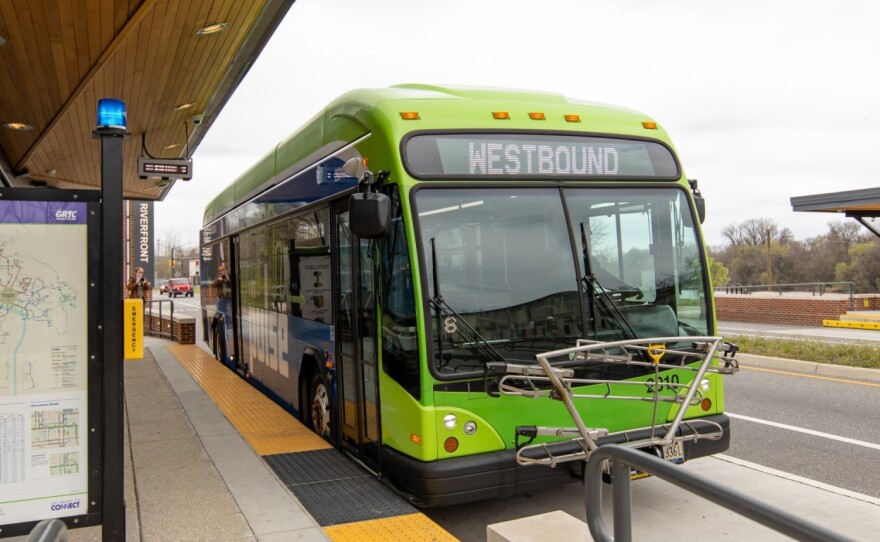At a Board of Directors meeting Tuesday, GRTC CEO Julie Timm told the board that riders can expect some service cuts due to a current and pending driver and mechanic shortage. She said the COVID-19 Delta variant has spread rapidly through the staff.
“We know that going into December and January last year, with the holidays, we saw a peak in COVID infection,” Timm said. “It’s not unreasonable to see it again this year because of the issues with vaccinations.”
Timm said December is also a time when union member drivers are able to adjust their shift times. Before the pandemic, she said GRTC projected needing about 300 bus drivers, which would've helped service growth. Currently, that number stands at 250. Timm said pandemic service levels require about 280 operators.
The numbers for mechanics are counted separately. In pre-pandemic times, the transit company needed 35 full-time mechanics and had a shortage of three positions. That number still holds true but now, GRTC needs 11 positions filled to catch up.
“While we are treading water, we have a strong position,” Timm said. “I am raising the yellow flag, that if we are unable to continue to manage these from a position of strength, we might see some more service cuts in December, in able to make sure that our service maintains its reliability for what we have on the street.”
She wants riders to realize that any service cuts, adjustments or realignments GRTC makes will focus on maintaining service to the highest ridership areas. To maintain some level of service for all destinations, Timm said they are looking at supplemental partners, such as universities, to train drivers to operate smaller vehicles.
Timm said they will work with vanpools, carpools and app-based rideshares to help with any issues. She also noted that the zero fare policy instituted during the pandemic reduced wait times and helped maintain a higher level of service.
Reduction Issues
Timm said part of the reduction in the workforce--which is a national issue--is coming from employees taking time off to care for family members or due to getting COVID-19. About a dozen employees are expected to retire soon.
She also foresees about five to twenty employees quitting if they’re required to get vaccinated by an upcoming federal mandate. Currently, Timm said over 70% of their workforce has reported being vaccinated.
“We are watching that very carefully but we expect that unless there are some court rulings to overturn that, we will have a vaccine mandate at GRTC within the coming weeks,” Timm said.
The federal mandate states in part that all employers with 100 or more employees must ensure their workforce is fully vaccinated or require any workers who remain unvaccinated to produce a negative test result on at least a weekly basis before coming to work.
*In a strongly worded letter sent Tuesday to the board of directors, Richmond Mayor Levar Stoney said in part that "It is inexplicable that we have regional and federal dollars coming in and we are proposing cutting 20 percent of GRTC’s service."
Hiring Solutions
During the meeting, Chief of Transit Operations Tim Barham said, “We’re losing more people than we’re bringing in,” and that GRTC is looking at creative ways to hire more drivers, which includes school bus drivers.
“We’ve had conversations with our partners over at neighboring school bus operations,” Barham said. “They’re having their challenges as well, with recruiting and finding operators. We’re looking for the same individuals. One thing we’re looking at probably is recruiting part-time school bus operators. They’re off on weekends, holidays and evenings.”
Director of Communications, Carrie Rose Pace said that changes happen to retirements, career moves and with people staying home due to COVID-19.
"Pre-COVID, we were actively hiring and retaining at greater rates than many in the industry, and certainly at a greater rate than the rate of retirements," Rose Pace said. "We have strong retention with many GRTC staff working with us for 20, 30, even greater than 40 years. Unfortunately, in the COVID-world where some people aren’t applying or can’t apply for jobs, we are finding it difficult to replace our retirees now."
Competition for bus drivers in the Richmond region has been an ongoing issue prior to the pandemic. And since the start of the school year, local districts have been having the same hiring issues. But Timm said GRTC drivers aren’t leaving to drive for schools, partly because the driver and mechanic pay at the company is higher.
“Right now, top pay is around $26 an hour,” Timm said. “They can make that top pay within two years of working for us.”
Timm added that drivers also get 11 paid holidays, 12 paid sick days, 1-6 weeks of paid vacation and 85% of their healthcare is paid. By comparison, new school bus drivers in Chesterfield are being paid over $20 an hour.
Timm also said they are helping drivers get their Commercial Drivers License from the Department of Motor Vehicles quicker.
Before, new drivers had to go to the DMV to get tested. The pandemic made DMV appointments difficult to schedule, costing GRTC applicants who couldn’t wait for months.
But now drivers can get approved on site. “DMV has worked with us very closely to help us get approvals on site,” Timm said. “We now have the capacity in house to both test people for their learners [permit] as well as test people for their final.”
Timm said they are also adding a $5,000 hiring bonus for drivers and $8,500 for mechanics\. The payment would be spread out over the course of one-to-two-years.
While changes are almost certainly coming, Timm said it was too early to say which of two or three scenarios they’ll adopt.
*The letter from Mayor Levar Stoney and quote was added after this article was first published.



